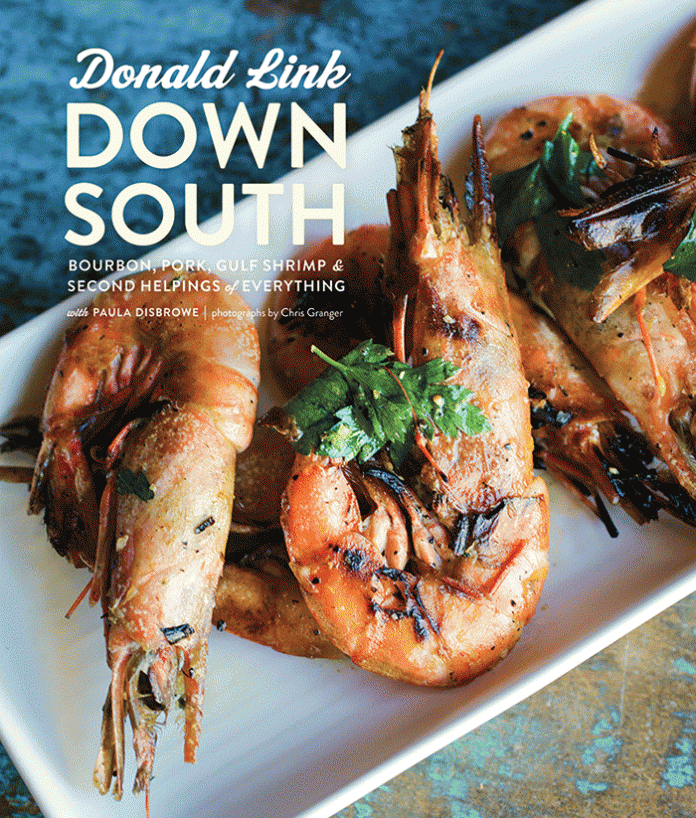Bridging the gap between the old school and new wave of Southern cuisine.
Donald Link is Cajun country, born and bred. He began cooking as a boy with his grandfather in Southern Louisiana, spent a spell in San Francisco honing his techniques at the California Culinary Academy, and cooked at legendary restaurants like Bayona and Elite Café. But it wasn’t too long before he answered Mama’s call and settled back down in the bayou. In 2000, Donald opened his flagship restaurant, Herbsaint, in New Orleans and has since opened three more restaurants and won a laundry list of accolades, including James Beard Awards for Best Chef South and Best Cookbook for his first cookbook, Real Cajun. Drawing on the inspirations, conversations, and celebrations he’s shared below the Mason-Dixon and beyond, Down South reflects upon the flavors of the past and the evolving new South.
How does Down South differ from Real Cajun?
My first book was very personal, filled with stories about growing up in Louisiana. I focused on my grandparents’ cooking and the food I grew up with. Down South focuses on the South I see today and how the food I grew up with is translated to today’s palate.
What’s one thing you hope people take away after reading and cooking from Down South?
Hopefully, it will give them a different impression of the South. It’s more than fried chicken and collard greens. And there are so many different sub sections of the South. Each state and region is unique. There’s not a blanket type of cuisine.
What have you found to be true of all Southern cooking, no matter the region?
Even though the cuisine is not ALL fried chicken, there’s a reason there is that stereotype. Everyone loves fried chicken, cornbread, and black-eyed peas. But it’s interesting when you get down to the coast. You don’t see much of it.
How is Louisiana cooking different from other places?
Louisiana definitely has the most unique Southern cooking. You find food here that you don’t see anywhere else. The only reason I even grew up on collards and pig’s feet was because my granddad was originally from Alabama. My dad’s side of the family has been in Southern Louisiana for generations, and it has its own culture.
What music do you listen to in the kitchen?
Rock and roll, basically. I love Kings of Leon because they’re a good Southern band but aren’t overtly Southern. And The Allman Brothers, for sure.
Southern food—or at least elements of it—is a national trend. What’s one untapped Southern tradition you’d like to see make a resurgence?
Mom-and-pop places like I ate at growing up. Restaurants that aren’t hip or fine dining. I’d like to see more restaurants where you can go and get good butterbeans and collards. There was a place I went to in high school called the Cajun Café, and they would do plate lunches like my granddad’s cooking. I haven’t had anything that good in about 20 years.
It’s your last meal on earth. What are you eating?
Boiled crawfish. Nothing else needed.
What’s your favorite kind of party to throw?
Anything where there is cooking outside involved. Friends, some drinks, good music—that’s a good time. It’s always fun getting together with my Fatback Collective friends [a group of chefs, restaurateurs, writers, and entrepreneurs who originally joined forces over bourbon and competition barbecue].
Your family, particularly your granddad and your Aunt Sally, had a big impact on your cooking. What are the most enduring lessons they taught you?
The way they cooked has so much depth. That flavor profile is missing from a lot of Southern food today. Even though there’s a lot of good Southern food out there, it’s still not like that down-home, dirty, rich, saucy, fatty food of my youth. My Aunt Sally cooked a lot like my granddad ( her dad), and he was such an inspiration for a lot of my food. After he died, Aunt Sally carried on his style of cooking. So when I visit, she always has something cooking for us. (Don’t miss her coconut pie recipe below.)
What does the new South mean to you?
The food has become more varied. There are different people and different cultures immersing into Southern culture. For example, a lot of these recipes may not be traditionally Southern, but are inspired by experiences I’ve had and people I’ve met in the South.
What’s next for you?
I recently opened Pêche in New Orleans, which was inspired by trips to Uruguay and Spain. I combined those regions and flavors with my own experiences on the Gulf Coast. I’m now planning trips and looking for new places where I might find that next inspiration.
Photos reprinted with permission from Down South by Donald Link.







